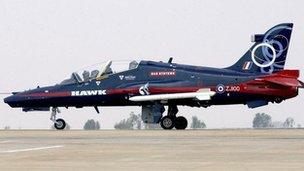BAE Systems and Saudi Arabia sign £1.9bn Hawk jet deal
- Published

Hawk trainer jets are built at BAE's factory in Brough, in the East Riding of Yorkshire
British defence giant BAE has signed a £1.9bn ($3bn) deal to supply Hawk trainer jets to Saudi Arabia, safeguarding over 200 UK jobs.
The military contractor said the deal averted job losses at its Brough plant and guaranteed work for 30 apprentices.
Twenty-two Hawks will be built under the deal with the majority of the work taking place in Lancashire - at BAE sites in Samlesbury and Warton.
A Unite trade union official said hundreds of jobs were still at risk.
BAE had previously said it was ending manufacture of the Hawk training jets at its Brough factory in 2013, with the loss of 865 jobs. Planes have been made at the plant for almost 100 years.
But the company said on Wednesday 218 jobs at the Brough factory had been saved until mid-2015 and 73 more employees could be offered transfers to plants in Lancashire.
'Good news'
Ministry of Defence officials said the arms deal would also provide the Saudis with "cutting edge officer and aircrew training capability".
The deal also includes 55 Pilatus PC-21 aircraft, which are manufactured in Switzerland.
BAE's Guy Griffiths said the deal was part of the company's "long history in the kingdom of Saudi Arabia".
He said the Saudi Royal Air Force would now have access to the "very latest in advanced simulation for radar, weapons and defensive aids training".
Prime Minister David Cameron told MPs the deal was "more good news for British jobs, for British investment and British Aerospace".
But Unite's Ian Waddell said it was still a "massive challenge" to save 650 jobs which are still under threat.
"Two hundred jobs saved feels like a drop in the ocean for our members. BAE's strategy of transferring Hawk from the Brough site to Lancashire was predicated on them winning this Saudi order, so it will not save any of the jobs currently under threat at either Brough or the Lancashire sites," he added.
The order also includes 55 trainers and 25 primary training aircraft, as well as upgraded training facilities, and initial spares support, the MoD said.
MoD officials said the deal reflected the Saudis' "confidence" both in the Hawk jets and the UK's "ability to continue to meet Saudi Arabia's legitimate defence requirements".
Ben Wallace, chair of a House of Commons group of MPs interested in Iran, said the British government had been trying for a long time to increase aerospace sales and the Saudi deal was "the result of a lot of hard work behind the scenes".
He defended arms deals with Saudi Arabia, saying the country was "stable", strong and moving towards human rights reform.
Roy Cartwright, Unite: "205 are still at risk, and we haven't given up the fight for them yet"
An investigation into BAE's Saudi Arabian deals following accusations of corruption was dropped in 2010. The defence firm denied charges of corruption and bribery over payments made to win contracts but was fined £286m.
Campaigners argued BAE should have answered the corruption claims in court but a deal was struck with the UK government to plead guilty to lesser charges over their account keeping.
In 2006 Saudi Arabia - the world's dominant oil producer - ordered 72 Eurofighter Typhoon aircraft from BAE in a deal worth at least £6bn.
BAE employ 40,000 people in the UK and is one of the world's leading arms contractors generating almost £20bn in sales in 2011.
Saudi Arabia sits on more than 25% of the world's known oil reserves and is capable of producing more than 10 million barrels per day.
Political parties are banned in the kingdom, which has been ruled by the Al Saud dynasty since its foundation.
- Published2 May 2012